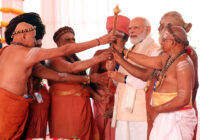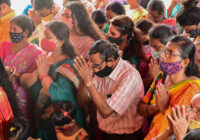“Namaste, brother” says Chaitanya, a pudgy, rosy-cheeked man from Charlotte, North Carolina, smiling broadly at me and my friend Alison. He wears a sleeveless orange tank top and white cotton balloon pants. He tells us the moniker was bestowed on him after an elaborate naming ceremony conducted on the banks of the holy river Ganges, in the north Indian city of Rishikesh. He paid 10,000 rupees to a Hindu priest for the conversion from Keith to Chaitanya. “Only a $150 for a whole new life man! It’s a steal if you think about it.”
As I’m absorbing this bit of information, he asks us to come to his stall and get our chakras balanced. “We all have stagnant energy and negative emotions trapped in the body crying out to be released. I call it ‘cosmic goo.’ It’s my job to suck it out and make you fly,” he says, making a whooshing sound with his lips.
We’ve had many similar conversations since arriving at Symbiosis, a “festival of transformation” held annually at different venues in California and Oregon, hugely popular with ravers, neo-Buddhists, yoga nuts, urban shamans, crystal fairies, biohackers, psychonauts, indie rockers and Rastafarians.
I decline Chaitanya’s generous offer, citing a yoga event we have signed up for. Ten minutes later, we find ourselves among a crowd of people facing a DJ console. Yoga of Bass was conceived by DJ FreQ Nasty (Darren McFayden) and yoga teacher Claire Thompson to “explore the ecstatic, life-changing experiences people have with music, yoga and the dance floor.” Their workshops include discussions on how the rave experience relates to neuroscience, and Buddhist psychology to “yoga trance dance” sessions, set to world dub and bass for meditative sound healing. I’m not sold on the new age spiel, but I can’t deny that it all does sound rather intriguing.
Save the Dharma
Soon Alison and I are swaying to the sensuous rhythms emanating from the gigantic speakers. Her jaded New York persona shows signs of thawing. Midway through the session, I spot a grizzled white guy with a matted grey beard approaching us on the dance floor. “Are you Indian or Latino?” he asks me directly. A bit taken aback, I answer that I am indeed of Indian heritage. He introduces himself as Surya (evidently Hindu names are in vogue in California) and launches into a wild rant about how the organizers of the festival are “plundering the spiritual resources of the global south” and “stealing our sacred traditions.”
He gesticulates wildly and sniffles as he talks. He tells me that he is an activist, a self-appointed guardian of “indigenous knowledge” that in his view was being misappropriated by the “capitalist hetero-patriarchy” and milked for maximum gain. Surya is a regular at festivals and yoga studios protesting cultural appropriation by accosting random people and handing out pamphlets. He ran a Facebook group that got shut down when a bunch of people reported him to the authorities for threats and intimidation. He wants to know if I’ll join his campaign to “save the dharma.”
I roll my eyes and look at Alison, who is in splits from listening to him. I want to ask him why he has appropriated an Indian name for himself, but stop myself just in time. Alison rescues me by saying we have to run or we’ll get caught in rush hour traffic. He hands me his calling card before we part ways.
Hindu nationalists and the Christian right have one thing in common: a shared hatred of Muslims, leading to the incongruous sight of brown people working with white supremacists toward the erasure of other brown people.
With the rapid proliferation of yoga in the West, especially in America (it pulls in approximately $11 billion per year), there are increasingly aggressive calls to police the industry. Surya belongs to a growing tribe of converts — so called “white Hindus” — who believe it is their karmic duty to save yoga from those who desecrate it.
A textbook example is David Frawley, aka Pandit Vamadeva Shastri, an American teacher of yoga, Ayurveda and Vedic astrology, and now a mascot for the Rashtriya Swayamsevak Sangh (RSS), a right-wing Hindu paramilitary organization, whose founders were deeply influenced by Hitler and Mussolini. Frawley is constantly engaged in battle with the perceived enemies of Hinduism, namely liberals, academics, journalists, Muslims and Christians, all of whom he rails against for their supposedly “anti-national” views. He has many fans who share his dream of establishing a pure Hindu theocracy.
The yoga culture wars, while always contentious, have only intensified with the rise of Hindu nationalism, an ideology that threatens to flatten the dynamic pluralism of Hindu thought into a static monolith. This mentality is percolating into the wider yoga world with efforts to deploy yoga as a symbol of Hindu soft power through events like International Day of Yoga.
As Debashish Banerji, a scholar at the California Institute of Integral Studies, told me in an interview, “Due to the proliferation of Western educational models and the assimilation of postcolonial populations under global capitalism, the majority of middle class India lacks a foundation in its traditional scholarship yet seeks the psychological security of a national identity. Yoga is touted by the Hindu right as just this badge of national identity; so that an enormous section of the majoritarian population unthinkingly embraces its chauvinistic identity politics, a most dangerous development.”
Navigating the trenches of the modern yoga world can feel like treading through a minefield. Susanna Barkataki, a board adviser for the Yoga Alliance, the largest yoga certification body in America, has been waging a lonely battle to honor the cultural diversity within yoga traditions while ensuring that all the voices clamoring for attention are heard.
Honor Yoga
She wasn’t always an insider. Her early attempts to initiate dialogue with the Yoga Alliance fell on deaf ears. “I had been writing to Yoga Alliance for over a decade, for many years asking them to address many things such as the need for doing more to acknowledge South Asian roots and contributions to yoga,” she tells me. “For years my writing went unanswered. I had given up hope when Yoga Alliance reached out and asked me to be a part of a group of consultants on a committee for their standards review process. I’m grateful YA invited in ‘outsider’ perspectives, and as a South Asian, I say that with irony.”
Barkataki recently organized an online summit to discuss cultural misappropriation in the yoga world. Unfortunately, it did not go down well in some quarters. Some members of the Global Decolonizing Initiative, a Facebook group ostensibly created to bring awareness of cultural appropriation, were visibly upset at how the event unfolded. The group is crawling with David Frawley knockoffs, with names like Devi Bhaktananda, Yamuna Devi, Gayatri Devi and Nalini Devi, who spend their spare time worrying about Starbucks employees who don’t pronounce “namaste” the right way.
“This particular event is super problematic because it appears to be appropriating the topic of appropriation,” proclaimed Charles “Ekabhumi” Ellik, an American Hindu from the San Francisco Bay area, in a Facebook comment. “No traditionally trained yogins [sic] or lineage-holders connected to any traditional wisdom streams and paths are included.” Like many West Coast panhandlers, Ellik tried out a series of identities — a slam poet, a yoga teacher, a quasi-hippie mystic — before finding his true calling as a born-again Hindu. These days he sells coloring books of Hindu gods and goddesses and organizes spiritual retreats in India.
His business partner, Shivani Hawkins, founder of the Living Sanskrit program — an online platform that promotes a sanitized, reductive version of Hinduism catering to non-resident Indians and Western Indophiles — was more emphatic in her comments: “They’ve included NO indigenous stewards of actual indigenous traditions in this conference that’s about not appropriating. … They are also erasing and silencing anyone who questions them on this, or on their relationship to YA. This conference is a sham and should not be supported.”
As if on cue, a few days later an article by an anonymous collective appeared in Brown Girl Magazine, accusing Barkataki of “Hinduphobia” and selling out to Yoga Alliance, basically elaborating the points made earlier by Ellik, Hawkins and others in the Facebook group.
Susanna was diplomatic when I asked her to respond: “The main aim of the Honor Don’t Appropriate Yoga summit is to honor yoga, bring messy topics and issues to light, to be as intersectional as possible while exploring various perspectives on yoga, and to practice an honoring by coming together in thoughtful dialogue rather than tearing apart,” she said. “The aim was never to have one narrative, but to have many voices speak their perspectives and truths. I know we may not always agree or see eye to eye. This is part of what yoga in practice looks like for me. I embrace a diversity of viewpoints and am really grateful for many perspectives that seek to do their best to honor yoga.”
Misappropriation of indigenous traditions does exist and should not be brushed under the carpet. A glaring example is Matthew Remski, a Canadian yoga teacher who travels around the country delivering presentations on traditional Hindu texts like the Bhagwad Gita and the Yoga Sutras, and makes a living as an Ayurvedic consultant. Remski is a college dropout with no credentials in either Ayurveda, Indology or religious studies. Ordinarily, one would need to put in the years to acquire the qualifications and requisite skills before being licensed to teach. But it doesn’t quite work like that in yogaland. Here, anyone with a social media account and a gift of the gab can attract followers, become an overnight expert and start charging for courses and workshops.
Despite his chicanery, Remski was appointed as a consultant at Yoga Alliance. So, it’s not difficult to see why people might not trust the intentions of this organization.
The Flip Side
On the flip side, people who rail against cultural appropriation are often in cahoots with religious extremists responsible directly or indirectly for oppressing minorities in their country of origin. For example, an Albuquerque-based yoga teacher in her fifties named Sri Louise recently appeared on New Jersey-based Hindutva activist Rajiv Malhotra’s YouTube channel to protest cultural misappropriation, and can often be seen railing against “Hinduphobia” on social media. This American is clearly oblivious to the gob-smacking irony of aligning with a right-wing bigot to protest racism.
Besides, it has been amply demonstrated that “Hinduphobia” is a chimera from the paranoid fever swamps of the Hindu right with no basis in reality. “The charge of Hinduphobia holds that people who criticize the fundamental Hindu right wing, do so not because they oppose its sociopolitical positions and ramifications, but because they abhor the Hindu religion and Hindu individuals,” writes New Delhi-based columnist Mitali Saran. “It is applied indiscriminately to anyone who offers a critique of social inequity such as caste, which happens to be part of Hindu tradition. It is applied to those who offer a political critique, such as of a Hindu rashtra, which happens to be a goal of the Hindu Right. The fact that these critics oppose any other stripe of theocratic, majoritarian state structure, and inequitable social structures, in favor of a secular, pluralist notion of India, is virtually erased.”
A UK-based Hindutva activist, Satish Sharma, is active in a number of yoga groups and has become a poster boy for the “decolonize yoga” movement. However, Sharma leads a sordid double life that many in the yoga community choose to ignore. Apart from his rabid nativism, Sharma has been at the forefront of the movement opposing legislation that would ban caste-based discrimination in the UK.
 In his capacity as general secretary of National Council of Hindu Temples, Sharma invited Stephen Lennon, aka Tommy Robinson, the former head of the right-wing anti-immigrant English Defense League, to speak at the Vishwa Hindu Kendra, one of the oldest Hindu temples in the UK. Hindu nationalists and the Christian right have one thing in common: a shared hatred of Muslims, leading to the incongruous sight of brown people working with white supremacists toward the erasure of other brown people. (Robinson is now helping to launch Pegida UK, a branch of the German white-nationalist group.)
In his capacity as general secretary of National Council of Hindu Temples, Sharma invited Stephen Lennon, aka Tommy Robinson, the former head of the right-wing anti-immigrant English Defense League, to speak at the Vishwa Hindu Kendra, one of the oldest Hindu temples in the UK. Hindu nationalists and the Christian right have one thing in common: a shared hatred of Muslims, leading to the incongruous sight of brown people working with white supremacists toward the erasure of other brown people. (Robinson is now helping to launch Pegida UK, a branch of the German white-nationalist group.)
The other person in Sharma’s proposed lineup was Subramaniam Swamy, an academic-turned-politician who had been previously sacked from an American university for his outrageously bigoted views on religious minorities in India. Swamy has also referred to homosexuals as “genetically flawed” and has vigorously opposed legislation to decriminalize homosexuality in India. When the temple administration found out that Sharma had invited Swamy and Robinson to speak at the event, they immediately canceled it.
By deploying the spurious charge of “Hinduphobia” against detractors, Sharma and his ilk attempt to normalize Hindutva in the West by playing the victim card. Sadly, his intended target, the Western yogi, is usually too obtuse to catch on. When I asked Ellik if he was concerned about Hindutva ideology percolating into the wider yoga world, he used the classic ostrich maneuver: “My guru strongly urged me to avoid conflict and debate due to developments in my practice.”
In a diverse cultural landscape and with several voices clamoring for attention, a one-size-fits-all approach to yoga is simply not viable. The need of the hour is for flexibility, openness and sensitivity combined with the ability to fend off bigots, charlatans and obscurantists. The yoga world needs more people like Barkataki who can operate “within systems, outside of them as well as in relationship to them,” as she put it to me. “We as people, as practitioners, are also so very powerful. This work has not ended. It really is just beginning. It’s up to you and others to continue asking and requiring accountability for ourselves and institutions like Yoga Alliance and others around us so that the yoga we practice is one of unity while honoring diversity.”
The views expressed in this article are the author’s own and do not necessarily reflect Fair Observer’s editorial policy.
Support Fair Observer
We rely on your support for our independence, diversity and quality.
For more than 10 years, Fair Observer has been free, fair and independent. No billionaire owns us, no advertisers control us. We are a reader-supported nonprofit. Unlike many other publications, we keep our content free for readers regardless of where they live or whether they can afford to pay. We have no paywalls and no ads.
In the post-truth era of fake news, echo chambers and filter bubbles, we publish a plurality of perspectives from around the world. Anyone can publish with us, but everyone goes through a rigorous editorial process. So, you get fact-checked, well-reasoned content instead of noise.
We publish 2,500+ voices from 90+ countries. We also conduct education and training programs
on subjects ranging from digital media and journalism to writing and critical thinking. This
doesn’t come cheap. Servers, editors, trainers and web developers cost
money.
Please consider supporting us on a regular basis as a recurring donor or a
sustaining member.
Will you support FO’s journalism?
We rely on your support for our independence, diversity and quality.






